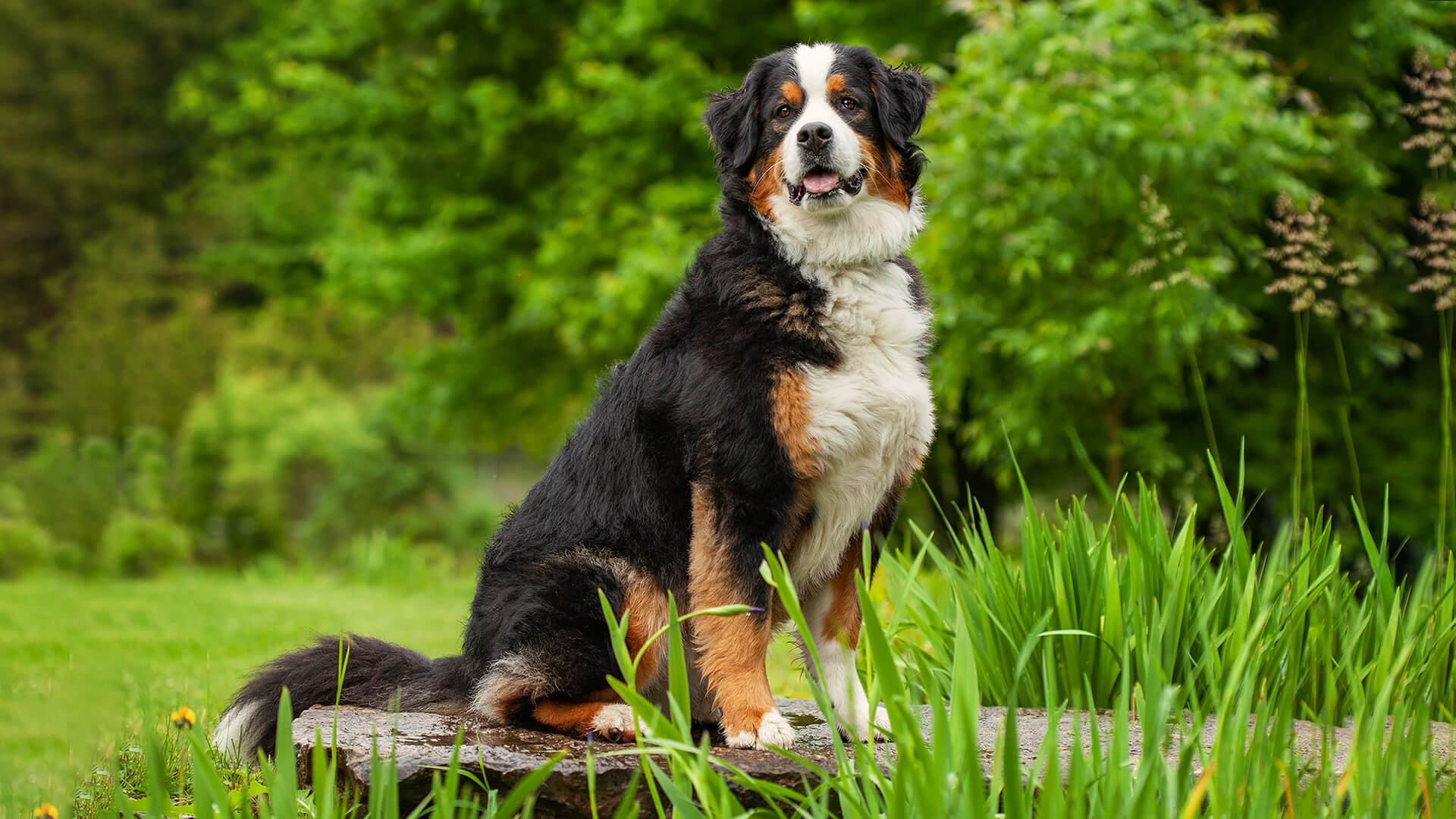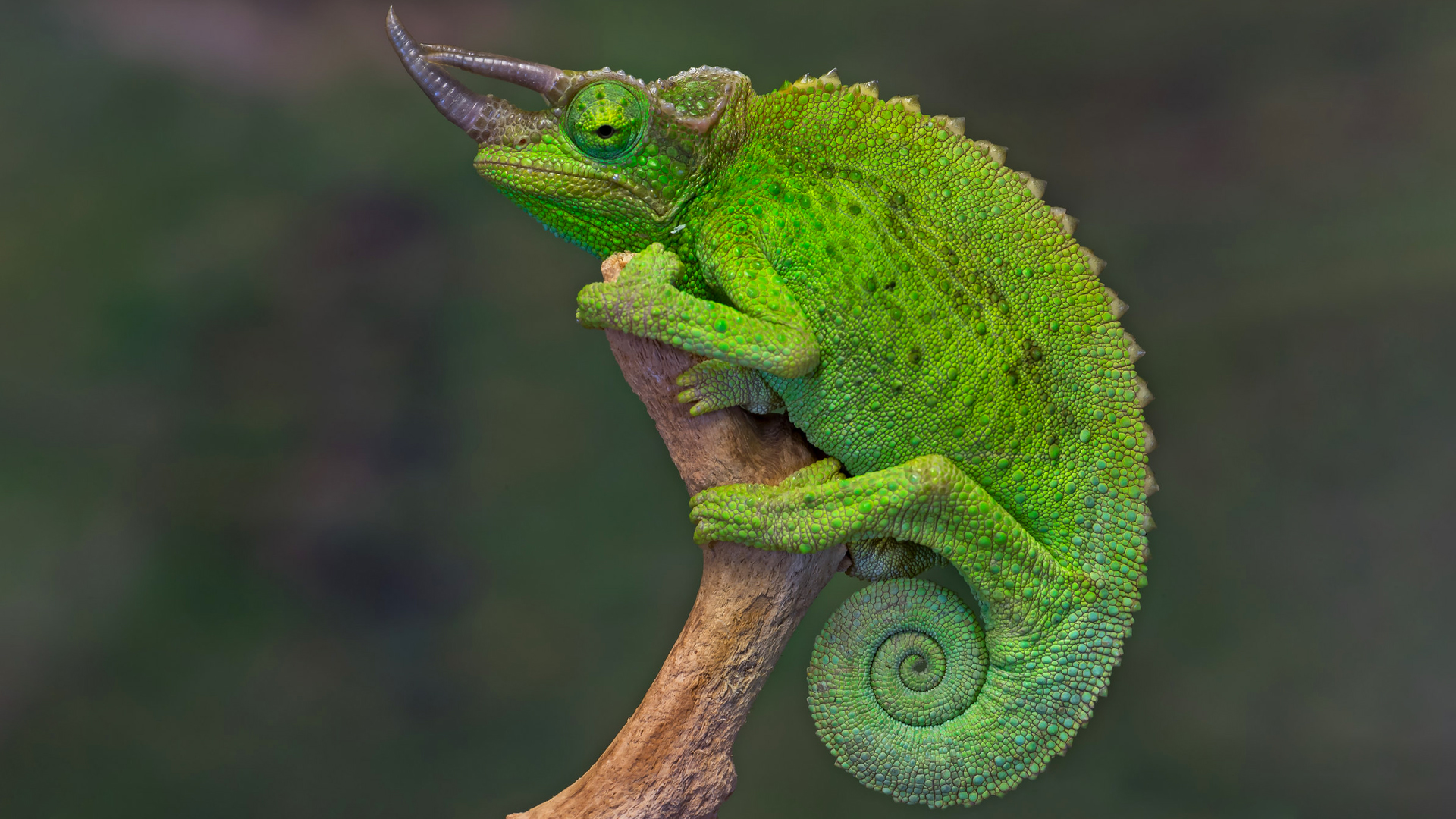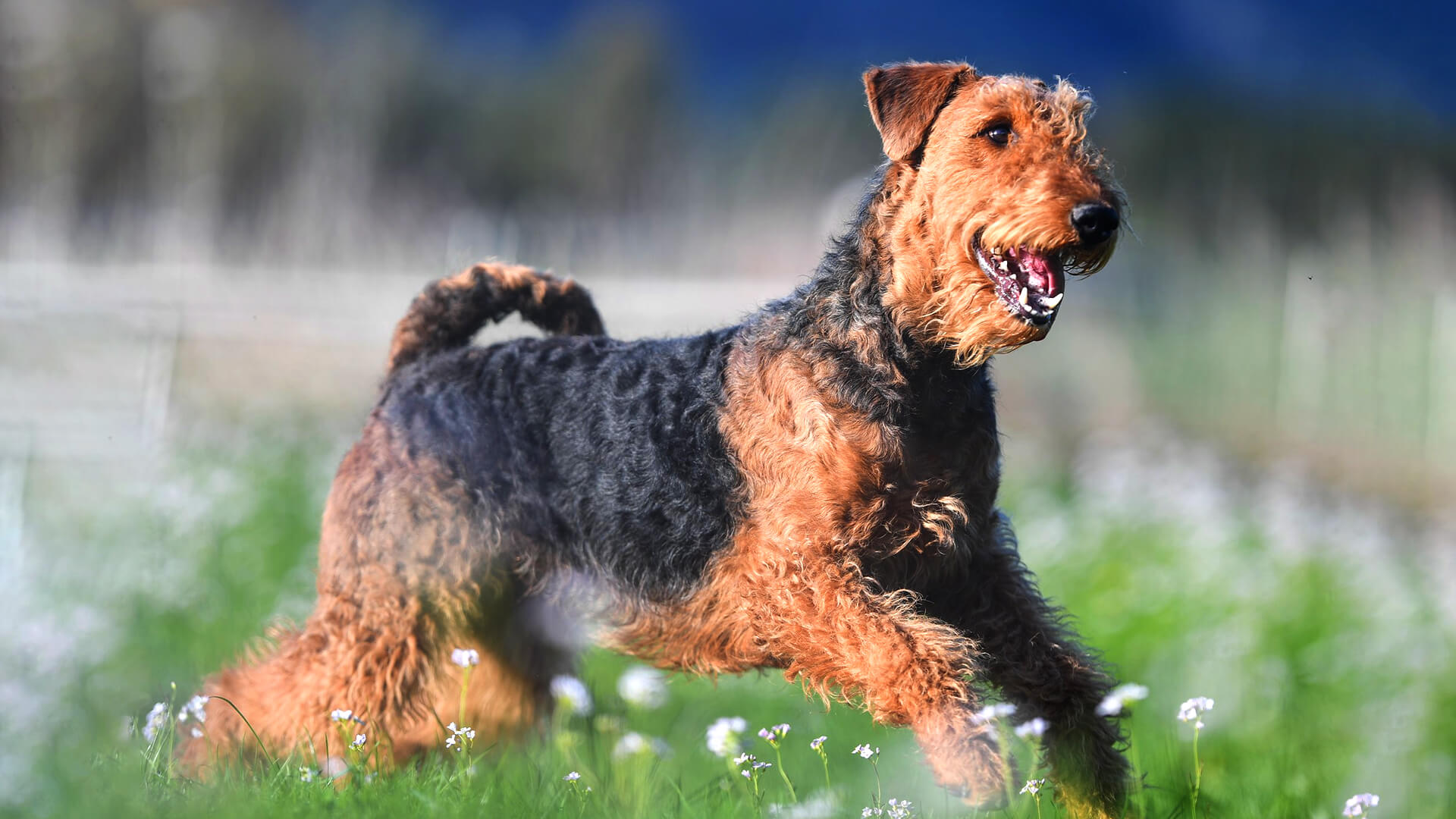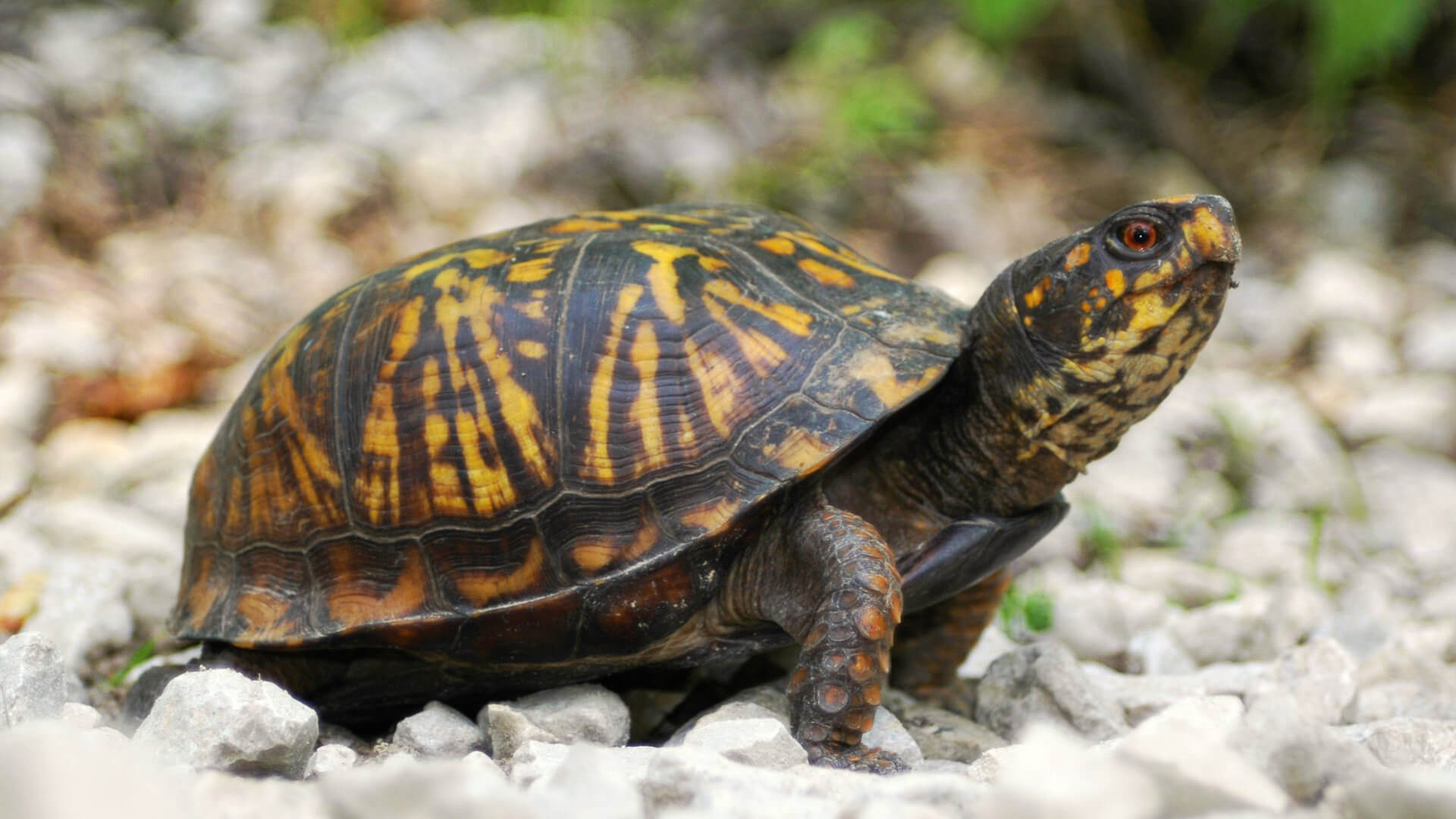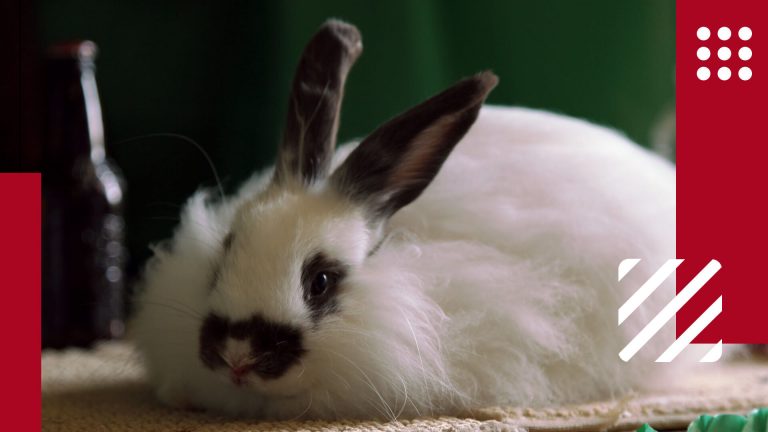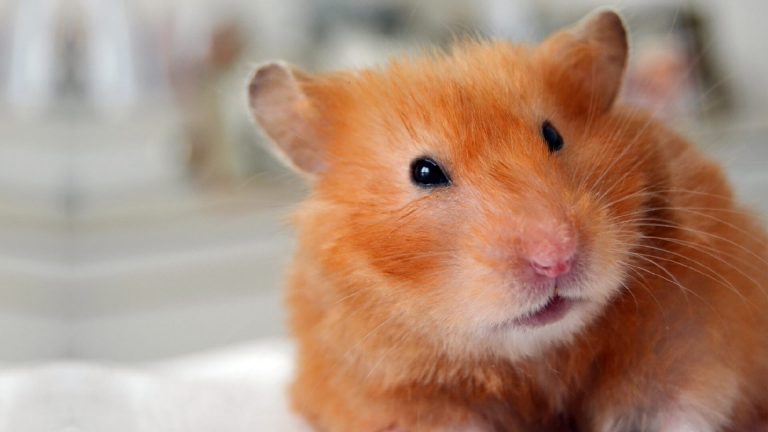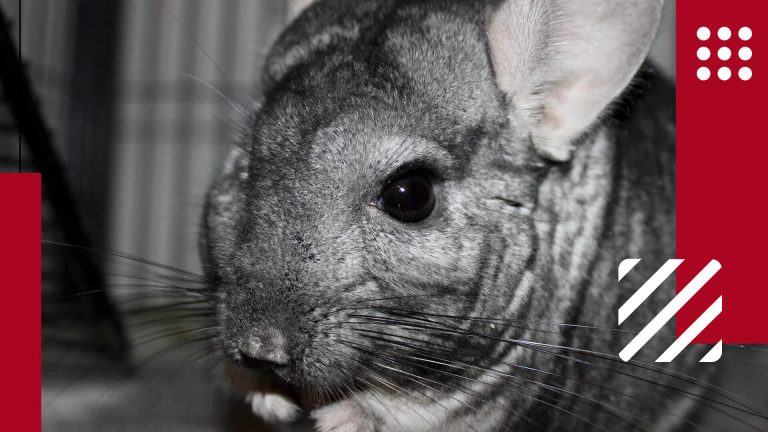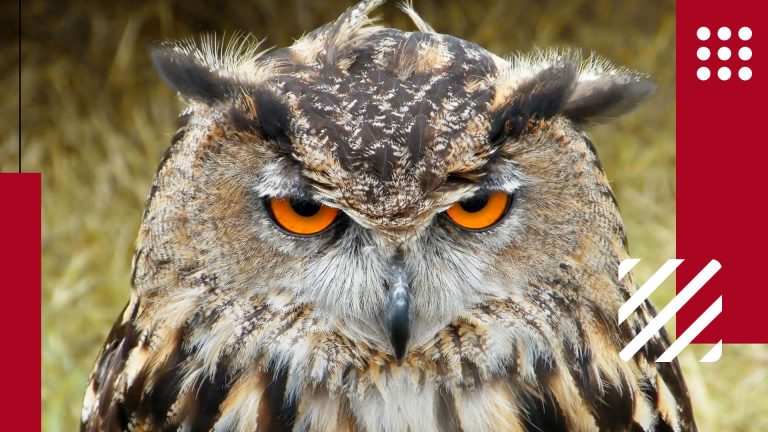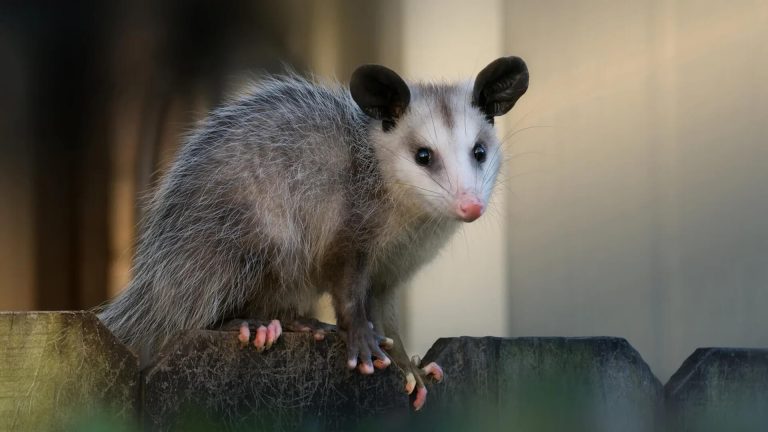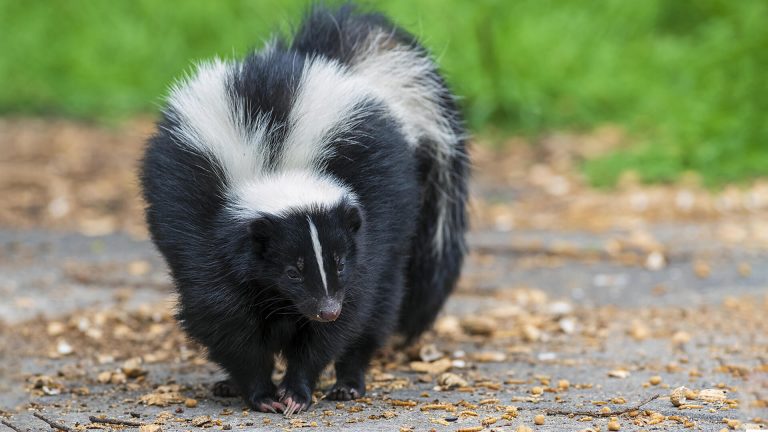Degus, adorable and sociable rodents native to the Andes Mountains in South America, have been capturing the hearts of pet enthusiasts around the world. These small creatures, resembling a cross between a rat and a gerbil, are known for their inquisitive nature and playful antics.
While not as commonly kept as pets as some other rodents, degus can make wonderful companions for those willing to provide them with the care and attention they require. In this article, we will delve into the world of degus, exploring their diet, behavior, appearance, health risks, and habitat requirements. Whether you're considering adopting a degu or simply curious about these charming rodents, this guide will provide valuable insights into the world of these unique pets.
Distinctive Features of Degu
| Scientific Name | Octodon degus |
| Lifespan | Up to 8 years |
| Color | Brown with a yellow underbelly |
| Size | Up to 12 inches |
| Weight | 6-14 ounces |
| Health Risk | Moderate |
| Cage Size | Minimum 24" x 18" x 24" |
| Unique Trait | Long, tufted tail |
| Famous For | Sociable and active nature |
| Temperament | Curious, social, and energetic |
| Maintenance | Low |
| Adaptability | High |
| Behavior | Diurnal, enjoys digging and exploring |
| Personality | Playful, intelligent, and vocal |
| Social | Highly social, thrives in pairs or groups |
The degu, which belongs to the family Octodontidae in the order Rodentia, comes in various breeds, including the Moon-toothed degu (Octodon lunatus), Bridges's degu (O. bridgesi), and the Mocha Island degu (O. pacificus). These small creatures inhabit complex underground burrows in community groups.
A typical degu has a compact body measuring 9.8-12.2 inches in length and weighing 6-14 ounces. It is covered in thick, silky fur that is yellow-brown on the top and creamy-yellow underneath. The degu has distinct yellow markings around its eyes and neck. Their vision is keen and they are even capable of seeing ultraviolet light. Interestingly, both their urine and the fur on their stomach reflect UV light.
With a slender tail measuring 8-13 cm in length, the degu has a tufted black tip. Its ears are dark, rounded, and lightly furred. The degu possesses light grey five-toed feet, with the fifth toe on the forefeet featuring a small nail instead of a claw. The hind feet are equipped with comb-like bristles. The hind limbs are shorter than the forelimbs. The name "Octodon" is derived from the shape of their teeth, which resemble the number eight. Degus have relatively large heads and eyes.
To maintain a healthy and oil-free coat, degus require regular sand baths two or three times a week for approximately half an hour. These creatures exhibit a wide range of communication skills, expressing themselves through around 15 different sounds. The auditory development of degu offspring relies on their ability to hear their mother's calls, which is essential for the normal evolution of their emotional systems. They also engage in scent-marking with their urine to communicate and acknowledge their surroundings.
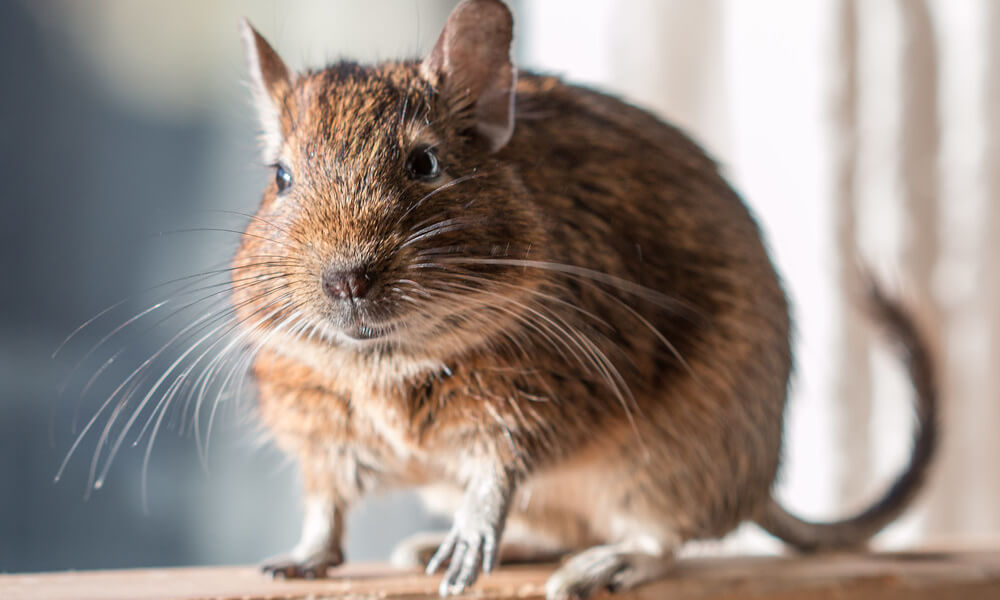
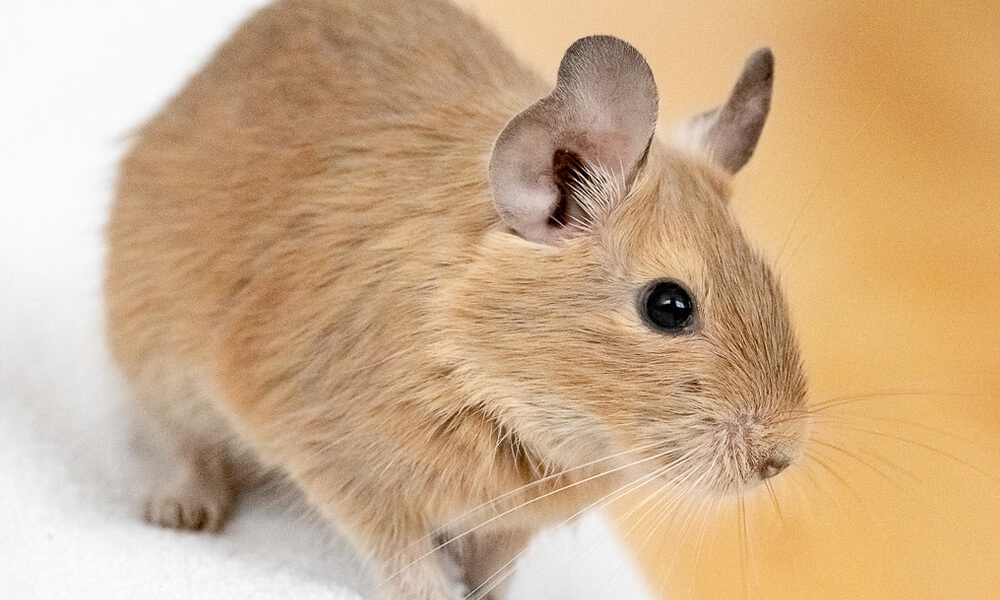
How to Take Care of Pet Degu?
Degus are not like other pets and people are less likely to keep them as pets. But if you want to keep degu as a pet then you should know how to set up their habitat, what to feed them and how to take care of them.
How to Setup Habitat for Pet Degu?
Pet degus thrive in a spacious cage, and a minimum size of 24 inches by 18 inches by 24 inches is suitable for housing two degus. Opting for a multilevel cage allows for increased movement and exploration. A mesh cage design provides good ventilation, as degus are prone to respiratory issues. It's important to note that degus are avid chewers, and materials like wood and plastic may be damaged or used as an escape route. Providing chew toys helps alleviate boredom.
However, a cage with a plastic bottom is recommended to prevent injury. To protect their feet, line the multilevels with grass mats or soft fabric. Avoid using cedar or pine shavings as bedding, as their strong scent can be toxic to degus.
A wooden nesting box with dimensions of 6 by 8 inches and a flat roof mimics the burrows that degus create in the wild. Fill the nesting box with materials such as tissues, paper towels, hay, or shredded paper for nesting purposes. Paper-based bedding helps absorb moisture, but it should be changed regularly to maintain cleanliness. Since degus spend their days digging tunnels and burrowing, providing a solid-surface exercise wheel with a diameter of 11 inches is essential for their physical activity.
Maintaining an optimal temperature range of 65-75°F is crucial for the well-being of degus. They don't sweat, and temperatures near 80°F can cause them to overheat. Regular outings from the cage are necessary for exercise. However, when allowing degus out of their cage, it's important to supervise them closely as they are curious, adventurous, and fast. They may chew on objects they encounter or accidentally get themselves stuck.
Degus are social animals and thrive when kept in the company of other degus, especially if introduced at a young age. Adult degus should be introduced gradually to avoid potential conflicts. It's best to house degus in same-sex pairs, as keeping females in sight of males can lead to fights. It is not advisable to house degus with other rodent species such as hamsters, chinchillas, guinea pigs, or rabbits, as territorial conflicts may arise over resources.
What to Feed Pet Degu?
In the wild, degus have a strictly herbivorous diet consisting of grass, leaves of shrubs, and seeds. They have adapted to thrive on a high-fiber diet, which is essential for their overall health. Additionally, degus practice coprophagy, which is the consumption of their own feces, to extract additional nutrients and maintain a healthy gut function during periods of food scarcity.
It's important to note that degus have an intolerance towards sugar, so it is crucial to avoid feeding them fruits or treats that contain molasses or honey. Instead, a suitable diet for pet degus in captivity includes low protein pellets, low carbohydrate foods, and a variety of roughage-rich vegetables. Daily meals can consist of leafy greens, root vegetables like potatoes, spinach, parsley, green beans, dark lettuces, cucumber, and carrots. It is recommended to serve their food twice a day.
While alfalfa hay is enjoyed by degus, it should be given only occasionally as it is high in protein and calories, which can lead to obesity. Fresh vegetables, such as peeled and uncooked sweet potatoes, can also be offered as treats. Hay is an important component of their diet as it provides the necessary fiber for their intestinal health and helps maintain proper teeth chewing.
Cruciferous vegetables like cabbage, broccoli, and sprouts should be avoided or given sparingly as degus may have difficulty digesting them in excess. It's also important to moderate the consumption of seeds and nuts with high-fat content, such as sunflower seeds, peanuts, and whole nuts. While these foods are beneficial for growth and reproduction, excessive intake can lead to weight gain. A mineral or salt block specifically designed for rodents can serve as both a distraction and a source of additional nutrition.
Fresh, clean water should always be available to pet degus, preferably provided in a water bowl that should be washed with hot soapy water on a daily basis to maintain cleanliness and hygiene.
Bathing & Hygiene Needs of Pet Degu
Bathing and maintaining proper hygiene are important aspects of caring for pet degus. Here are some guidelines to ensure their cleanliness and well-being:
- Dust Bathing: Degus have a natural instinct to clean themselves through dust bathing. Provide a shallow container filled with chinchilla or degu-specific dust for them to roll in. Dust baths should be provided two to three times a week, allowing them to spend around 15-30 minutes in the dust. This helps remove excess oils and keeps their fur clean and healthy.
- Cage Cleaning: Regular cleaning of the degu's cage is essential to maintain a clean environment. Remove soiled bedding, droppings, and uneaten food daily. Deep clean the cage and accessories at least once a week using mild, pet-safe disinfectants. Ensure thorough rinsing and drying of the cage to prevent any residual chemicals from harming the degu.
- Grooming: Degus have specific grooming needs, particularly when it comes to their teeth and nails. Their teeth continuously grow throughout their lives, so provide them with chew toys or wooden blocks to keep their teeth worn down. Additionally, check their nails regularly and trim them if they become too long. Seek guidance from a veterinarian or a professional on proper nail trimming techniques.
- Preventing Odor: Degus have a musky odor that can be minimized through proper cage cleaning and maintaining good hygiene. Avoid using strong-smelling cleaning agents or scented products near the degu's living area, as it may irritate their respiratory system.
- Preventing Overbathing: While dust baths are essential, degus should not be bathed with water. Their delicate skin is prone to drying and can lead to health issues. Dust baths are sufficient for maintaining their hygiene, and excessive exposure to water should be avoided.
What it's Like to Have a Pet Degu?
When it comes to taming and interacting with pet degus, understanding their behavior and needs is crucial. Here are some important considerations for handling and bonding with degus:
Taming and Handling Degus
Untamed common degus can be prone to biting, but they are intelligent creatures that can be easily tamed. Consistent non-predatory handling and providing food help in this process of transition. It is important to avoid catching a degu by its tail, as it can result in the shedding or pulling off of the skin and tuft, which is a painful experience. The tail does not grow back after shedding, and degus will typically chew off the damaged part to reduce the risk of infection.
Communication and Bonding
Once in a home environment, degus become accustomed to their owner's schedule and will often come forward to greet them. They also enjoy playing with their owners and can show affectionate responses, such as appreciating belly rubs. Degus communicate through various sounds, including chitter-chatter, high-pitched screeches when stressed or threatened, and whistling and warbling sounds during grooming sessions. They can learn sounds from their parents and may even groom their owners through amiable nibbling, which helps in forming a bond.
Biting Behavior and Proper Handling Techniques
Degus generally do not resort to biting unless they feel cornered or threatened. While a nip from a pet degu does not usually cause pain or break the skin, defensive biting can lead to injury. To handle a degu, one hand can be placed over the back, behind the front legs, while the other hand supports the hind end. It is important to hold them close to the chest or in your lap, as they are not comfortable with their legs dangling. It is essential to check local regulations regarding the ownership of degus, as they may be considered an invasive species and prohibited in some countries.
Interaction with Owners and Other Pets
Degus can recognize their owners and other degus through sight and sound. They may stand up on their hind legs in their cage to indicate their desire to come out when they see their owners. Degus can make good pets for elementary school children and older kids under adult guidance. They can also be kept alongside other pets like cats and dogs, although predatory animals should be kept away to ensure the safety of the degus. Through interaction with humans and other pets, degus can develop trust, problem-solving skills, and empathy.
What are the Health Concerns of Pet Degu?
Degus, being hardy rodents, generally enjoy good health and do not require vaccinations. However, there are some common diseases and health issues that degus may be prone to, and it's important for owners to be aware of them:
- Diabetes: Degus are susceptible to diabetes, a condition characterized by high blood sugar levels. Providing a balanced diet with limited sugar content, such as low-carbohydrate pellets and a variety of fresh vegetables, can help prevent the development of diabetes. Regular monitoring of their diet and maintaining a healthy weight is crucial.
- Bacterial Infection (Bumblefoot): Bumblefoot is a bacterial infection that affects the feet of degus. It can cause foot sores, swelling, and discomfort. To prevent this condition, ensure that the degu's cage has a clean and suitable substrate, such as soft bedding, to minimize the risk of foot injuries. Regularly check their feet for any signs of redness, swelling, or sores, and consult a veterinarian if necessary.
- Dental Disease and Mouth Infections: Degus have continuously growing teeth, and if their teeth become overgrown or misaligned, it can lead to dental disease and mouth infections. Providing chewable toys, wooden blocks, and branches helps keep their teeth worn down and prevents painful dental issues. Regularly observe their eating habits and consult a veterinarian if you notice any signs of dental problems, such as difficulty eating or drooling.
- Skin Disorders: Degus are prone to skin disorders, such as dry skin and mites. Regular dust baths using chinchilla or degu-specific dust help keep their skin clean, remove excess oils, and prevent dryness. Dust baths should be provided two to three times a week to maintain optimal skin health. If you notice any signs of skin irritation, excessive scratching, or hair loss, consult a veterinarian for appropriate treatment.
- Respiratory Tract Illness: Degus can develop respiratory tract infections if their living environment is not kept clean. Regularly clean the degu's enclosure, removing any soiled bedding, droppings, and dust. Good ventilation and maintaining proper humidity levels in the cage can also help prevent respiratory issues. If you notice any signs of respiratory distress, such as labored breathing or sneezing, seek veterinary attention promptly.
It's important to note that providing a clean and suitable living environment, a balanced diet, regular veterinary check-ups, and attentive observation of your pet degu's health are key to preventing and managing these common health issues.
What People Are Reading:
Frequently Asked Questions About Pet Degu
Some of the most commonly asked questions about pet degu are answered below:
Is Degu a good pet?
Degus can make good pets for the right owner. They are social, intelligent, and entertaining creatures. With proper care, handling, and socialization, they can form strong bonds with their owners. However, it's important to note that degus require a significant commitment of time, effort, and resources. They have specific dietary and housing needs, and they thrive when provided with ample mental and physical stimulation. Potential owners should research and understand the responsibilities involved in caring for degus before deciding to adopt them as pets.
Are Degus cuddly?
Degus are not typically considered cuddly pets. They are highly active and curious rodents that prefer interactive play and exploration. While they may enjoy being handled and stroked by their owners, they are not known for seeking or enjoying cuddling or lap time like some other pets. However, each degu has its own personality, and some individuals may show more affinity for physical contact than others. It's important to respect their preferences and provide them with enrichment activities that align with their natural behaviors.
Where do Degus live in the wild?
Degus are native to the central regions of Chile, South America. In the wild, they inhabit areas with dry, scrubby vegetation, rocky outcrops, and grasslands. They are well adapted to living in complex underground burrows, which they dig themselves. These burrows provide them with shelter, protection from predators, and a suitable environment for social interaction and breeding.
What are the best ways to keep pet Degus calm?
The best ways to keep pet degus calm are by providing them with a spacious and enriched cage, social interaction with same-sex companions, gentle handling and interaction, maintaining a consistent routine, and offering various enrichment activities to keep them mentally stimulated.

